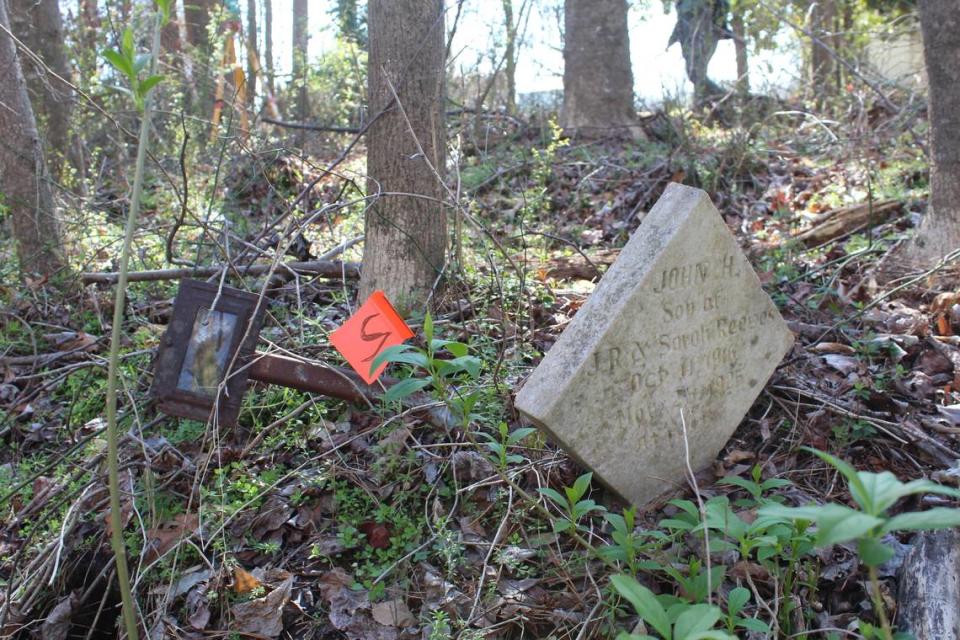Hidden African-American cemetery with 400 graves found on unclaimed land in NC town
A rare example of land that belongs to no one has been found in the eastern North Carolina town of Ayden.
Nearly three acres along North Lee Street do not show up on tax records.
Overgrown, seldom visited and classically spooky, the spot is known among town elders as an abandoned graveyard for African Americans, some of whom may have been born into slavery.
An investigation into the site’s mysterious past has been launched by East Carolina University, with plans to map it, log in the surviving grave markers, and use ground penetrating radar to find the borders. Ayden, with a population of about 5,000, is approximately 90 miles southeast of Raleigh.
Charles Ewen of East Carolina’s Phelps Archaeology Laboratory says work began several weeks ago and the discoveries have been surprising.
“There are nearly 400 graves in the cemetery, the majority of which are simple unmarked depressions in the earth,” Ewen told McClatchy News.
“It is the largest abandoned cemetery I have encountered. I have investigated over two dozen cemeteries in the past two decades. ... You can drive by it and not even know it’s there.”
The earliest marked grave is from around 1908 and the most recent is from 1963, he says. More graves may be found when they use ground penetrating radar in the fall, Ewen said.
Among the mysteries is who is buried there and why it was largely forgotten, despite being adjacent to an active city-owned cemetery with about 1,000 graves. The larger cemetery dates to 1955, which means the history of the two graveyards overlapped for about a decade, Ewen said.
“There could be surprises, like coming across someone who was influential in Ayden history that people forgot were buried there,” Ewen said. “We helped reclaim an overgrown African-American cemetery in Bellhaven, North Carolina, and came across the grave of Little Eva. Is there another Little Eva in the cemetery? I don’t know.”
“Little Eva” Boyd was a 1960s pop singer and Bellhaven native known for such mega hits as the “The Loco-Motion.”
Abandoned African-American cemeteries are a growing area of interest among anthropologists, who call them “forgotten parts of the landscape” and casualties of the segregation era. Experts want to find “patterns of abandonment and their causes,” Ewen said.
Ayden town officials asked Ewen to get involved after a Boy Scout announced in 2020 he intended to clean up the cemetery as part of an Eagle Scout project.
Conversations in the community have revealed people just blocks away didn’t realize the cemetery existed, which made Ewen even more interested in the project. The historic norm, he says, was for African-Americans to bury their dead on land no one else wanted.
“The African-American community in the segregated South was forced to bury their dead wherever they could find unused land and maintain it themselves,” Ewen said.

“In the 1960s, desegregation meant that there was a town-maintained cemetery they could make use of. Families maintained the old cemetery for awhile, but it gradually fell into neglect as it was nobody’s job to take care of it. This is very common on small family cemeteries of all races. And here we are 60 years later where few people even know about it.”
The cemetery had largely returned to the wild when Ewen first set foot on it. This included a covering of oak trees, blackberry thickets, poison ivy and occasional pockets of daffodil, a plant historically used to mark graves.
Ayden town officials have expressed an interest in restoring the cemetery’s reputation in the community.
Town manager Matthew Livingston says the town “technically” owns the site by default, and he’d like to see it protected and made more accessible. He also has ideas for a historical marker at the spot and a trail.
“It’s the final resting place for many souls. This project would honor them and demonstrate that all citizens of all races do matter, past, present and future,” Livingston told McClatchy News.
“It’s a part of our history that should be remembered, restored where possible and not forgotten. Loved ones are buried there and we need to respect their final resting place. We (also) need to honor the families that have loved ones there by at least recognizing the cemetery exists.”

 Yahoo Movies
Yahoo Movies 
